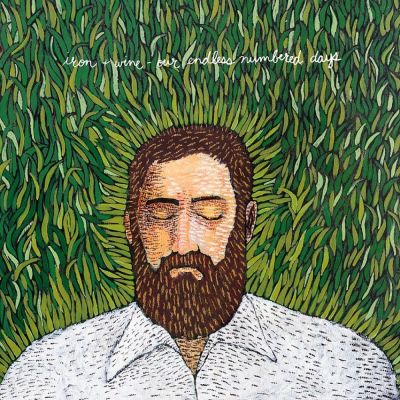Sam Beam is the poet laureate of the forlorn sleepy South.
Although based in Texas these days, Beam’s roots stretch back to an areas of my home state, South Carolina, and into the regions of Georgia and Florida.
Beam is the kind of musician who soaks in, filters, and re-projects the influences of musicians around him. And since his earliest incarnation as a ghostly bedroom whisperer on 2002's The Creek Drank the Cradle, Beam has planted his feet inside different pairs of shoes, with differing results. The one constant you'll get with Iron and Wine is Beam's humid, swamp-soaked voice and an anchor of acoustic guitar. Even when he's pushing against the aural walls of creativity as on Kiss Each Other Clean or trying his luck with a West Coast-by-way-of New Mexico dustbowl sound, as on his EP with Calexico, In the Reins, or his own The Shepherd's Dog, an acoustic guitar is never too far out of reach.
And thank God. Because while Beam is a textbook example of a artist who refuses to remain stagnant in his musicianship, he's at his most impressive when his guitar and voice coalesce together and set a gentle fire alight around him. To that end, Our Endless Numbered Days isn't so much a collection of campfire songs as it is one of the only dimly lit truck stops available for miles in the wilderness of highways.
Our Endless Numbered Days, on its own, is an album of clarity and sheer beauty. Now, the "b" word is not one I like to toss around, given its Freshmen Composition-level of overuse. But beauty is the only word I can conjure with "Naked As We Came" echoing inside my cochlear nerve in a predawn timeframe of early Autumn. Currently, "Naked As We Came" is Iron and Wine's most-played song on Spotify at 88 million plays--nearly 30 million more than the next most-played song in Beam's repertoire, "Flightless Bird, American Mouth" and bookended by his cover of The Postal Service's "Such Great Heights."
"Naked As We Came" is an easy song to enjoy and an even easier song to appreciate for its simplicity and repeatability.
Perhaps more than any other song, "Naked As We Came" sounds, to me, most akin to Nick Drake's "Pink Moon."
Despite their obvious similarities and both men's hushed, bedroom vocals, "Naked" and "Pink Moon" bear the marks of agelessness and ageless beauty. True, Drake's song has more than a few decades on Beam's, and time may erase both men's songs before long, but I always hear both songs as if each time were the first introduction again and again.
"Naked" is an easy song to revel in; even easier to appreciate maybe because of its simplicity and near-unanimous repeatability. I don't know. All I do know is the song acts as one of those ambiguous evocations that reaches across preferential divides. You may prefer a playlist that is heavy on Jim Croce and Pete Seeger, while and I might prefer the noisiness of drone metal, but "Naked As We Came," like its title and lyrics suggest, is all the great equalizer. And songs like those becomes fewer and fewer every year.
Where "Naked" is the clear favorite of the duo, "Sodom, South Georgia" sits deeper in the mine. The penultimate track on the album, it's easy enough to omit it or miss it entirely in the rush to get to album closer, "Passing Afternoon." But "Sodom" isn't just tossed off to wait in line and, more importantly, it doesn't fall under the weight of Beam's heavily unadulterated acoustic formula for this album. As much as I love this album, there is a definite stretch in the middle where my mind wanders aimlessly. But the fictional realm of Sodom, South Georgia (not a real place, mind you) and the magical realism of Beam's lyrical imagery always pull me back down to the earth.
I'm always tripping over lines like "slept like a bucket of snow," "woke like a tree full of bees," and "all dead white boys." Each one a phrase I recognize almost immediately as some stilted Southern phrase to describe the misfit identity of the South. Beam, like his predecessors William Faulkner, Eudora Welty, and Flannery O'Connor (of whom I can definitely imagine her writing a short story titled, "Sodom, South Georgia"), just lets the phrasing of the song slip off the end of his tongue and down into the sleepy humidity of the swamps. He's not necessarily trying to conjure up any images of place, geography, or even race. Instead, Beam captures his native language the best way he knows how; through turns of phrase, the poetry of place, and a simmer of time.
Beam has written other, better, songs than "Naked As We Came" and "Sodom, South Georgia," but, for sheer transparency of his talents, this pair of songs may as well be the culmination of his life's work. Good thing he was only getting started.


